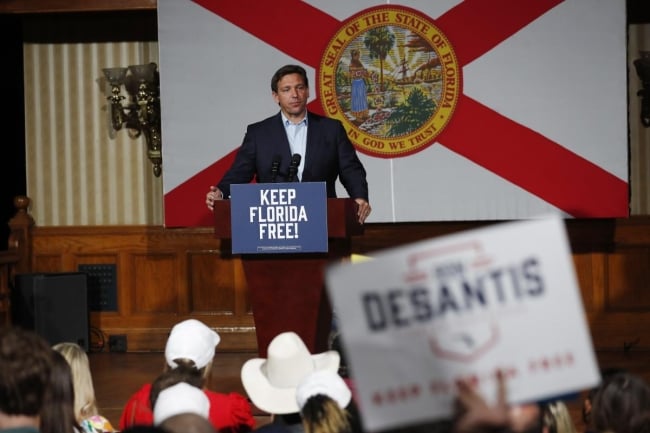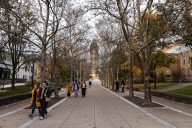You have /5 articles left.
Sign up for a free account or log in.

Florida governor Ron DeSantis wants to reshape New College of Florida, drawing inspiration from a private Christian university.
Octavio Jones/Getty Images
In his first term as Florida’s governor, Ron DeSantis sought to reshape higher education at the state level, pushing changes to accreditation requirements and tenure while requiring widely criticized intellectual diversity surveys and limiting diversity, equity and inclusion instruction in public colleges.
Freshly re-elected, he’s now shaking up higher ed at the campus level, aiming to transform the state’s public liberal arts college in the image of one of the country’s most visible private Christian colleges.
“It is our hope that New College of Florida will become Florida’s classical college, more along the lines of a Hillsdale of the South,” DeSantis chief of staff James Uthmeier told The Daily Caller.
On Friday, DeSantis appointed six new trustees at NCF: Christopher Rufo, Matthew Spalding, Charles R. Kesler, Mark Bauerlein, Debra Jenks and Eddie Speir. Of those, the first four are well-known conservative academics or activists who appear to live outside Florida.
Arguably the most prominent of the trustees is Rufo, who gained national attention for his campaign against the obscure academic concept of critical race theory, often conflating it with diversity, equity and inclusion programs and fueling a conservative backlash against DEI efforts.
Spalding, a dean at Hillsdale College, and Kesler, a professor at Claremont McKenna College, were both part of the Trump administration’s 1776 Commission, which produced a widely panned rebuttal to The New York Times’s “1619 Project.” Bauerlein, a professor at Emory University, has long been an advocate for classical education, arguing for the need to improve civics education. According to a news release announcing the new trustees, only two appear to live in Florida: Jenks is an NCF graduate and local lawyer, and Speir is the founder of a private K-12 school.
The six trustees will serve on a 13-member board, which will also include five members appointed by the Republican-led Florida Board of Governors as well as one student and one faculty trustee.
Their self-proclaimed mandate is to transform the small, public institution into a facsimile of the private, Christian university in Michigan that has rejected federal funding, guided the Trump administration and sought a national footprint by launching a chain of charter schools.
‘Hillsdale of the South’
In a state full of large public universities, the New College of Florida stands out as an anomaly. With just under 700 students, the liberal arts college is by far the smallest of the 12 institutions that make up the State University System of Florida.
Because of its size, NCF has been in the crosshairs of the state Legislature in recent years, with lawmakers arguing that it’s too expensive to operate. A failed 2020 bill would have stripped NCF of its independence and made the college part of Florida State University.
DeSantis press secretary Bryan Griffin said by email that New College of Florida “is a public institution with a statutorily stated mission of ‘provid[ing] a quality education.’ Unfortunately, like so many colleges and universities in America, this institution has been completely captured by a political ideology that puts trendy, truth-relative concepts above learning. In particular, New College of Florida has reached a moment of critical mass, wherein low student enrollment and other financial stresses have emerged from its skewed focus and impractical course offerings.”
Critics of DeSantis reject that argument and see the move as a takeover of an anomalous institution long targeted by state lawmakers.
“DeSantis has said in his commentary that the reason New College was selected was because it is overtly liberal. And that’s actually not true. We think the reason it was selected was because the Republican-led Legislature in Florida has, for years, been trying to find something to do with New College; there have been debates about absorbing it into larger campuses or university systems,” said Andrew Gothard, president of the United Faculty of Florida. “There have been very few attempts to increase funding, so it’s just been sitting on the sidelines for a while as they tried to figure out how exactly they wanted to deal with New College. I think they picked on New College because it is traditionally the university that gets picked on for these kinds of reasons.”
NCF’s size also makes it vulnerable to ideological hijacking by the board, critics argue.
“DeSantis never goes after anyone who can fight back,” Gothard said.
According to public statements, the new trustees have big plans for NCF. On Twitter, Rufo said the new board aims to turn the college into a classical liberal arts institution.
“We are now over the walls and ready to transform higher education from within. Under the leadership of Gov. DeSantis, our all-star board will demonstrate that the public universities, which have been corrupted by woke nihilism, can be recaptured, restructured, and reformed,” Rufo tweeted.
Rufo—who did not respond to a request for comment—said he would visit NCF in the coming weeks. It is unclear how expenses for out-of-state trustees will be reimbursed, with neither the governor’s office nor newly appointed trustees from out of state willing to comment on that matter.
Of the four out-of-state trustees, only Bauerlein responded to a request for comment, writing by email, “I wouldn’t talk to you about anything if you paid me $1,000.” Pressed for comment on whether taxpayers will fund expenses for out-of-state trustees to visit campus and the need for transparency, Bauerlein responded, in part, “I don’t need you to tell me what taxpayers deserve.”
NCF president Patricia Okker said in a statement that she sees “tremendous opportunity for New College and I believe that our new trustees will bring fresh ideas and new perspectives.”
Asked to respond to the governor’s criticism that NCF has gone “woke,” college officials did not provide a comment.
Hillsdale College also did not respond to a request for comment.
‘Laying Siege to the Institutions’
In appointing a swath of prominent conservative trustees to the NCF board, DeSantis seems to be drawing from a playbook that Rufo described in a speech at Hillsdale College in early 2022. While the speech focused more on conservative strategies to take control of local K-12 school boards, Rufo also talked about putting a conservative stamp on higher education. He argued that “militant liberalism” has been invading public institutions since the late 1960s, when leftist groups dissolved and entered public life in other ways.
“This march through our institutions, begun a half century ago, has now proved largely successful,” he said at Hillsdale. “Over the past two years, I’ve looked at the federal bureaucracy, the universities, K-12 schools and big corporations. And what I’ve found is that the revolutionary ideas of the ’60s have been repackaged, repurposed and injected into American life at the institutional level.”
He argued that radical theories on race and gender have been imposed by leftists and that conservatives need to take the power back from liberal institutions and end public funding for “private political activism.”
“These are public universities that should reflect and transmit the values of the public,” Rufo continued. “And the representatives of the public, i.e., state legislators, have the ultimate power to shape or reshape those institutions. So we have to get out of this idea that somehow a public university system is a totally independent entity that practices academic freedom.”
Reactions
As news of the trustee appointments spread last week, many Florida conservatives took victory laps, celebrating what they see as the takeover of a liberal institution.
“With these appointments, @GovRonDeSantis continues his quest to ensure higher education is a pursuit of truth and freedom, not woke indoctrination. Hillsdale of the South indeed!” tweeted Manny Diaz Jr., a former Republican lawmaker who is now Florida’s education commissioner.
Across the aisle, state Democratic lawmakers criticized the appointments.
Anna Eskamani, a member of Florida’s House of Representatives, noted on Twitter that the governor’s trustee appointments are subject to approval from the state Legislature. “That means State Senators need to approve the hostile takeover” of New College of Florida, she tweeted, urging Floridians to contact their elected officials and urge them to vote no on the appointments.
“So much attention on what’s happening at @NewCollegeofFL but not enough attention of how this sits in the larger framework of attacks on higher-ed in Florida,” Eskamani added, sharing a string of news articles about attacks on tenure, accreditation changes and other state policies.
NCF faculty members seem wary and unsure of what’s to come from the new board. Several professors did not respond to a request for comment from Inside Higher Ed. Steve Shipman, a chemistry professor and president of the NCF chapter of the United Faculty of Florida, said the new trustee appointments were initially met with shock that has since turned to uncertainty.
One area of concern Shipman highlighted is the gender studies program at NCF. Given critical statements from new trustees—particularly Rufo—about gender studies, Shipman said some employees are worried the department may be targeted.
Shipman described critiques of NCF as a wayward liberal institution as a “caricature” that doesn’t stand up to scrutiny. He noted that while Florida’s intellectual diversity survey had an “abysmal response rate,” it showed that NCF was not a liberal outlier among state institutions.
Ultimately, Shipman believes the governor targeted NCF not because of its reputation as a liberal hot spot but because its small size makes it easier to run a conservative experiment.
“From a financial perspective, we’re potentially easier to reshape than other places would be,” Shipman said.








